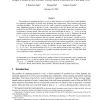Free Online Productivity Tools
i2Speak
i2Symbol
i2OCR
iTex2Img
iWeb2Print
iWeb2Shot
i2Type
iPdf2Split
iPdf2Merge
i2Bopomofo
i2Arabic
i2Style
i2Image
i2PDF
iLatex2Rtf
Sci2ools
131
click to vote
IANDC
2008
2008
Graph connectivity, partial words, and a theorem of Fine and Wilf
The problem of computing periods in words, or finite sequences of symbols from a finite alphabet, has important applications in several areas including data compression, string searching and pattern matching algorithms. The notion of period of a word is central in combinatorics on words. There are many fundamental results on periods of words. Among them is the well known and basic periodicity result of Fine and Wilf which intuitively determines how far two periodic events have to match in order to guarantee a common period. More precisely, any word with length at least p + q - gcd(p, q) having periods p and q has also period the greatest common divisor of p and q, gcd(p, q). Moreover, the bound p + q - gcd(p, q) is optimal since counterexamples can be provided for words of smaller length. Partial words, or finite sequences that may contain a number of "do not know" symbols or holes, appear in natural ways in several areas of current interest such as molecular biology, data c...
| Added | 10 Dec 2010 |
| Updated | 10 Dec 2010 |
| Type | Journal |
| Year | 2008 |
| Where | IANDC |
| Authors | Francine Blanchet-Sadri, Deepak Bal, Gautam Sisodia |
Comments (0)

